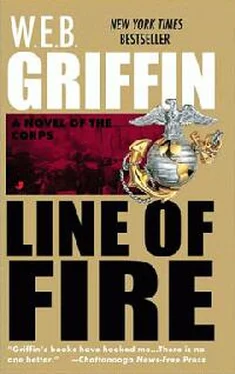W.E.B. Griffin - The Corps V - Line of Fire
Здесь есть возможность читать онлайн «W.E.B. Griffin - The Corps V - Line of Fire» весь текст электронной книги совершенно бесплатно (целиком полную версию без сокращений). В некоторых случаях можно слушать аудио, скачать через торрент в формате fb2 и присутствует краткое содержание. Жанр: prose_military, на английском языке. Описание произведения, (предисловие) а так же отзывы посетителей доступны на портале библиотеки ЛибКат.
- Название:The Corps V - Line of Fire
- Автор:
- Жанр:
- Год:неизвестен
- ISBN:нет данных
- Рейтинг книги:4 / 5. Голосов: 1
-
Избранное:Добавить в избранное
- Отзывы:
-
Ваша оценка:
- 80
- 1
- 2
- 3
- 4
- 5
The Corps V - Line of Fire: краткое содержание, описание и аннотация
Предлагаем к чтению аннотацию, описание, краткое содержание или предисловие (зависит от того, что написал сам автор книги «The Corps V - Line of Fire»). Если вы не нашли необходимую информацию о книге — напишите в комментариях, мы постараемся отыскать её.
The Corps V - Line of Fire — читать онлайн бесплатно полную книгу (весь текст) целиком
Ниже представлен текст книги, разбитый по страницам. Система сохранения места последней прочитанной страницы, позволяет с удобством читать онлайн бесплатно книгу «The Corps V - Line of Fire», без необходимости каждый раз заново искать на чём Вы остановились. Поставьте закладку, и сможете в любой момент перейти на страницу, на которой закончили чтение.
Интервал:
Закладка:
When the Japanese began their march down the Solomon Islands chain toward New Guinea, Australia, and New Zealand, the Australians hastily recruited plantation managers, schoolteachers, government technicians, shipping officials, and even a couple of missionaries who had lived on the islands.
They hastily commissioned these people as junior officers in the Royal Australian Navy Volunteer Reserve and left them behind on the islands, equipped with shortwave radios and small arms.
They were in a position to provide-at great risk to their lives-extremely valuable intelligence regarding Japanese Army and Navy movements, strength, location, and probable intentions. But the Navy arrogantly judged that information coming from natives who were not professional Navy types couldn't possibly be genuinely valuable.
Later, when the value of the Coastwatcher-provided intelligence could no longer be denied, the Navy brass decided that it was now far too important to he left to the administration of the lowly Royal Australian Navy Reserve Lieutenant Commander who was in charge. The U.S. Navy would take over and do it right, in other words.
Pickering heard of the situation from an old friend, Fitzhugh Boyer, who had been Pacific and Far East Shipping's agent in Melbourne and was now a Rear Admiral in the Royal Australian Navy. Fitz Boyer introduced him to Lieutenant Commander Eric Feldt, who was running the Coastwatcher Establishment, and who cheerfully confessed to being a little less than charming to the detachment of U.S. Navy officers who had shown up in Townsville to take over his operation.
Fitz Boyer told Pickering that it was unfortunately true that Feldt did indeed tell the captain who led the detachment that unless he left Townsville that very day, he was going to tear his head off and stick it up his anal cavity.
That same day Pickering fired off an URGENT radio to Frank Knox, recommending that a highly qualified intelligence officer be sent to Australia as soon as possible, with orders to place himself at Feldt's disposal, and with the means to provide Feldt with whatever assistance, especially financial, Feldt needed.
Nine days later, Major Edward J. Banning, USMC, former Intelligence Officer of the Fourth Marines in Shanghai, got off a plane in Melbourne carrying a cashier's check drawn on the Treasury of the United States for a quarter of a million dollars.
He was accompanied by a sergeant. Within days the balance of Marine Corps Special Detachment 14, along with crates of the very best shortwave radios and other equipment, began to arrive by priority air shipment.
Banning and Feldt were two of a kind; they hit it off immediately. Not only that, Banning and his detachment proved to be precisely what Pickering had hoped for but thought he had little chance of getting.
Soon after a pair of U.S. Marines was parachuted onto Buka Island to augment the Coastwatcher operation there, Pickering confessed to Banning that he was astonished at the high quality of the people Frank Knox had sent him; and he was equally surprised that they'd arrived so quickly. And Banning replied that the man responsible was Rickabee.
"Mr. Knox is a wise man," Banning said. "He gave this job to Colonel Rickabee, together with the authority, and then let him do it."
That was the first time Pickering heard of Rickabee. But before he was ordered home, he'd had many other dealings with the man; and each contact confirmed his first impression: Rickabee was a man who got things done.
"Colonel Rickabee and you have many things in common, Fleming," Roosevelt said, smiling. "For instance, some people-not me, of course, but some people-think you both have abrasive personalities." Roosevelt waited for a reply, got none, and then went on.
"Another way to phrase that is that neither of you can suffer fools. As I'm sure you've learned, fools find that attitude distressing. That doesn't bother you, I know, but it does affect Rickabee."
"I don't think I follow you, Mr. President."
"When Admiral Leahy let the word out that the promotion of Lieutenant Colonel Rickabee to brigadier general was being considered, it was not greeted with enthusiasm. Quite the reverse."
"I think he would make a splendid general officer," Pickering said.
"So do I," Leahy said. "I've known him for a long time.
Even before I was Chief of Naval Operations, he did special jobs for me.
And he has done special jobs for me since."
"We have reached a certain meeting of the minds vis-a-vis Colonel Rickabee," Roosevelt said. "General Holcomb, the Marine Commandant, has recommended his promotion to colonel. Though I was prepared to send his name to the Senate for confirmation as a brigadier general without the approval of The Marine Corps, Admiral Leahy tells me that would have been counterproductive... and not only because it would have caused a lot of talk, which is exactly what Rickabee and the Office of Management Analysis does not want or need."
Jesus Christ, what bullshit! Pickering fumed. A damned good man can't get promoted because of the prima donnas!
"Colonel Rickabee's promotion doesn't solve the problem," Admiral Leahy said. "Which is, in rank-inflated Washington, that a general officer is needed to head up the Office of Management Analysis."
"Yes," Pickering thought out loud, "I can understand that."
"Good," Roosevelt said. "That's where you come in, Fleming."
"Sir," Pickering said, surprised, "I wouldn't have any idea whom to recommend for that. Nor would I presume to make such a recommendation."
"That's been done for you," Roosevelt said. "What Leahy and I have concluded is that the man in charge of the Office of Management Analysis should be someone who not only has experience at the upper levels of the Navy Department, say working closely with the Secretary of the Navy..
Christ, he's not talking about me, is he?
"... but who has also had firsthand experience with the war in the Pacific, and most importantly..."
Jesus H. Christ, he is!
"... is a Marine with extensive combat experience, say someone who won the Distinguished Service Cross in the First World War, and who in this war has been awarded the Silver Star, the Purple Heart, and the Legion of Merit."
What's he talking about, the Legion of Merit?
"Are you beginning to get the picture, Fleming?" Roosevelt asked.
"Mr. President..."
Roosevelt reached to the table beside him, opened an oblong box, and took a medal on its ribbon from it.
"Captain Pickering," he said, motioning for Pickering to lean over to him. He pinned the medal to Pickering's uniform.
"It is my great privilege, on the recommendation of the Commanding General, First Marine Division, to invest you with the Legion of Merit for your distinguished service as Acting G-2, First Marine Division, during combat operations on Guadalcanal."
"I don't deserve a medal for that," Pickering protested. "I was just filling in-the G-2 was killed-until they could get someone qualified in there."
"I think we can safely leave that judgment to General Vandergrift," Roosevelt said. "He made that recommendation, of course, without being aware that Admiral Leahy and I had something in mind for you."
"Mr. President, you can't really be thinking of-"
"Your name was sent to the Senate this afternoon, Fleming, for their advice and consent to your commission as Brigadier General, USMC Reserve. Now I realize that Richmond Fowler and I agree about very little, but I rather suspect that when I ask him to support your nomination, he'll come along... in a bipartisan gesture."
"I will be hated in The Marine Corps," Pickering said.
"Possibly," Admiral Leahy said. "But you're already hated in the Navy, so nothing is lost there. And no Marine is likely to criticize a fellow Marine with a record like yours. General Vandergrift does not hand out decorations like the Legion of Merit lightly." The President raised his voice slightly.
Читать дальшеИнтервал:
Закладка:
Похожие книги на «The Corps V - Line of Fire»
Представляем Вашему вниманию похожие книги на «The Corps V - Line of Fire» списком для выбора. Мы отобрали схожую по названию и смыслу литературу в надежде предоставить читателям больше вариантов отыскать новые, интересные, ещё непрочитанные произведения.
Обсуждение, отзывы о книге «The Corps V - Line of Fire» и просто собственные мнения читателей. Оставьте ваши комментарии, напишите, что Вы думаете о произведении, его смысле или главных героях. Укажите что конкретно понравилось, а что нет, и почему Вы так считаете.









